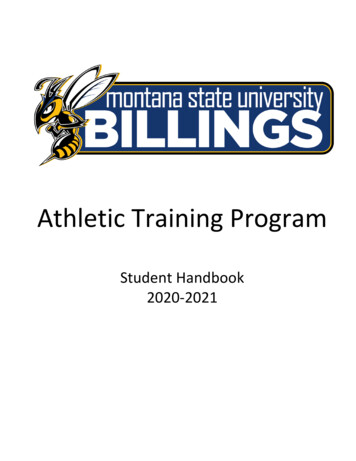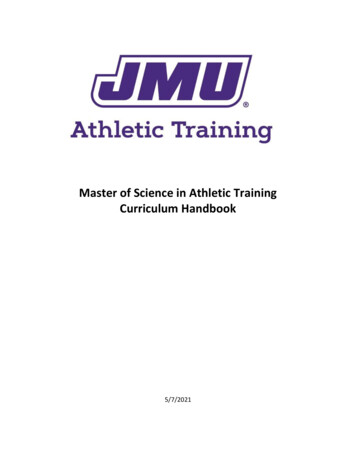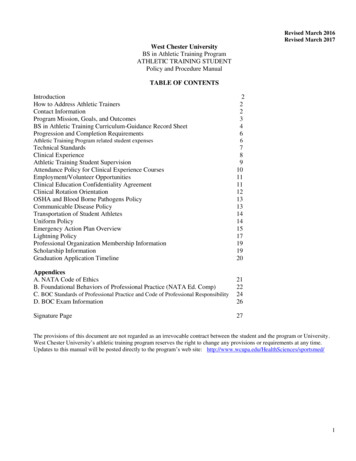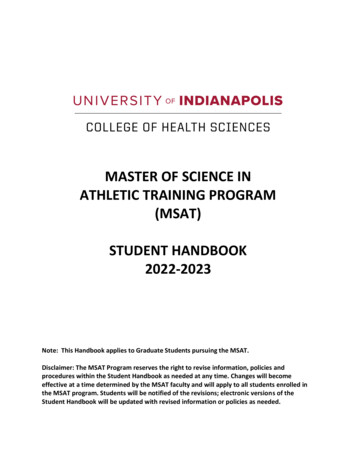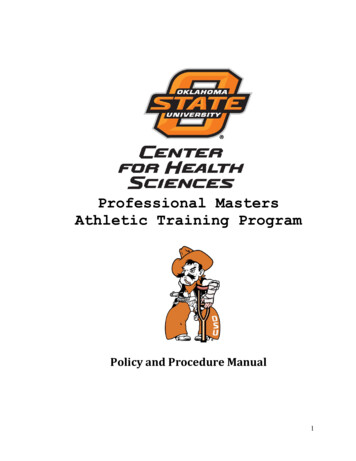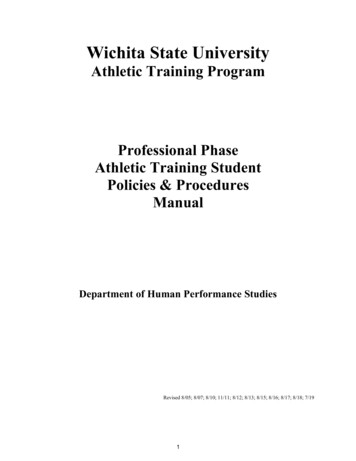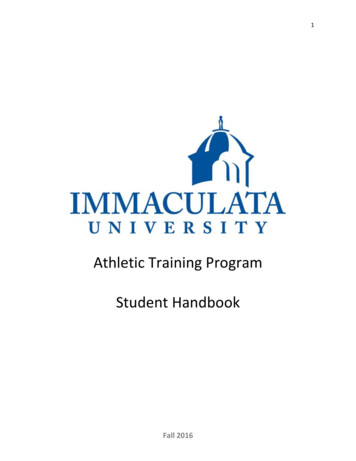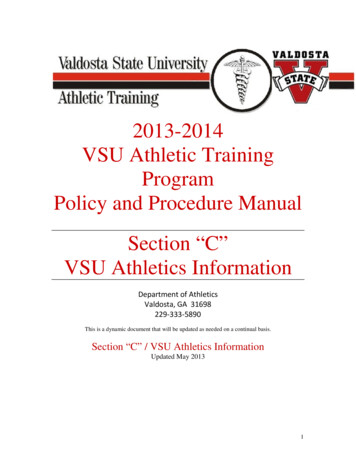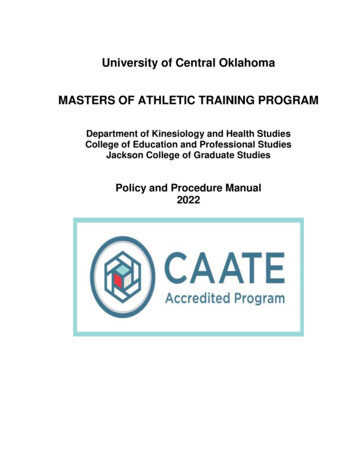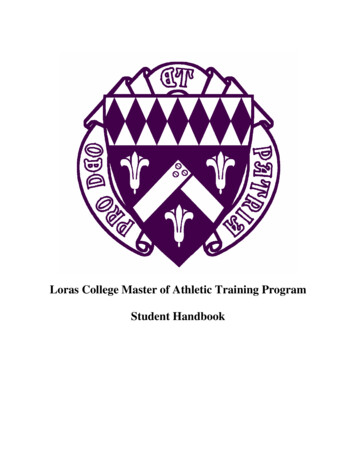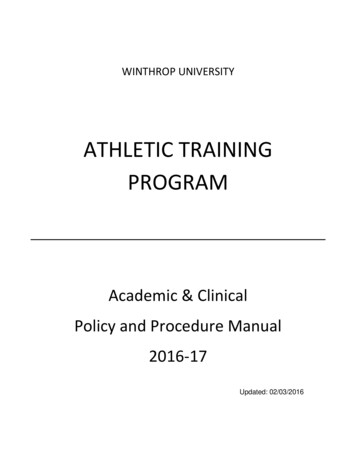
Transcription
WINTHROP UNIVERSITYATHLETIC TRAININGPROGRAMAcademic & ClinicalPolicy and Procedure Manual2016-17Updated: 02/03/2016
Winthrop UniversityRichard W. Riley College of EducationDepartment of Physical Education, Sport & Human PerformanceAthletic Training ProgramTo: Athletic Training StudentsThe following academic and clinical policies and procedures manual has been preparedfor the athletic training students in the Winthrop University Athletic Training Program (WUATP). All students enrolled in the athletic training major must read and accept thesepolicies and procedures. These policies are in addition to those established by WinthropUniversity, the College of Education, and the Department of Physical Education, Sport &Human Performance.The manual provides a brief outline of the athletic training education program, clinicalexperience responsibilities, and guidelines for professional conduct. Specificadministrative guidelines and injury care protocols are not within the scope of this manual.It is the duty of each athletic training student to know and understand the contents of thisdocument. It is the student’s responsibility to seek clarification for items that are not clear.Review this manual and keep it throughout your tenure in the athletic training educationprogram. Any updated information will be given to you as necessary.Alice J. McLaine, PhD, ATC, SCATLaura E. Carrell, MS, ATC, SCATProgram DirectorAthletic Training ProgramClinical Education CoordinatorAthletic Training ProgramSigned:Print Name:Date:
ATHLETIC TRAINING PROGRAM FACULTYAlice J. McLaine, PhD, ATC, SCATProgram Directormclainea@winthrop.eduLaura E. Carrell, MS, ATC, SCATClinical Education CoordinatorWest Center 116AColiseum 25West Center 3.323.4958carrelll@winthrop.eduATHLETIC TRAINING PROGRAM PRECEPTORS - WINTHROPM. BasketballJeff Lahr803.323.6248lahrj@winthrop.eduW. BasketballMartha Dettl803.323.6632dettlm@winthrop.eduBaseballM. SoccerW. SoccerVolleyballSeth FaulknerDaniel LundyLizzy DaidoneAlex 3.6630skelleya2@winthrop.eduCross Country/Track & FieldSoftballWomen’s LacrosseTennisM. GolfW. GolfSyrena Hess803.323.6630spanburghhesss2@winthrop.eduZach HartmanKiersten SchmidtJeff LahrJeff LahrMartha m@winthrop.eduATHLETIC TRAINING PROGRAM PRECEPTORS - OFF CAMPUS SITESClover High SchoolFort Mill High SchoolIndian Land High SchoolNation Ford High SchoolRock Hill High SchoolSouth Pointe High SchoolYork Comprehensive HighSchoolMarvin Ridge High SchoolKim BresslerMatt BresslerHenry SpruillKatie RunyonBen MerrittAl ShufordMichael AbrahamDanny ConleyMallorie EaslickPatty CurleyDaniel CharlesMike SmithAnna AdamsCharlie novanthealth.org
TABLE OF CONTENTSSection 1: Winthrop University Athletic Training ProgramIntroductionMission StatementVision StatementGoals and ObjectivesSection 2: Academic CurriculumProgram CurriculumSection 3: Admission, Retention, and Completion ProceduresPrerequisites & Application ProcessAppealsTechnical Standards for AdmissionRetention PolicyProgram CommunicationDisciplinary Action and ProbationEnd-of-Program Exam PolicyWU-ATP ChecklistSection 4: Transfer Student and Student Athlete RequirementsTransfer RequirementsStudent Athlete RequirementsSection 5: Professional Memberships and ConferencesNational Athletic Trainers’ AssociationSouth Carolina Athletic Trainers’ AssociationConference AttendanceSection 6: Additional Costs Associated with the ProgramSection 7: Clinical EducationTechnical Standards and Immunization VerificationIn-Service TrainingTypes of ExperiencesClinical Experience Course DescriptionsClinical ResponsibilitiesStudent Priorities
ExpectationsAppearanceAcceptable AttireUnacceptable AttireEmergency Cardiac Care CertificationDocumentation of HoursFamily Educational Rights and Privacy Act (FERPA)Communicable Disease PolicyHealth Insurance Portability and Accountability Act (HIPPA) & ConfidentialityCriminal Background ChecksDrug TestingPotential RisksLiability InformationSection 8: Professional InteractionsPreceptorsPhysicians and other Allied Health ProfessionalsAthletes/PatientsPeer Athletic Training StudentsCoaching StaffOther Athletic Department PersonnelProfessional Scouts, Media and General PublicSection 9: Evaluation of Clinical ExperienceClinical PerformanceAthletic Training Facility, Preceptors, and Clinical Education CoordinatorSection 10: Certification RequirementsBoard of CertificationSection 11: Exposure Control ProceduresBlood Borne Pathogen TrainingUniversal PrecautionsWound Care ProceduresCollection and Disposal ProceduresEnvironment Control RecommendationsUniversal PrecautionsEnvironmental Control/Hazardous Waste PolicyGame ManagementSection 12: Winthrop University Athletic Training Emergency Action Plans
Section 1: Winthrop University Athletic Training ProgramIntroductionAthletic training is the art and science of the prevention, recognition, care, and rehabilitation ofinjuries and illnesses in physically active individuals. It involves the organization and administrationof athletic training programs, as well as the education and counseling of the physically activepopulation. Athletic training has been recognized by the American Medical Association as an alliedhealth care profession and is practiced under the supervision of a physician. The governing bodyfor the profession is the National Athletic Trainers’ Association (NATA). The organizationresponsible for the certification of athletic trainers is the Board of Certification, Inc. (BOC).Since the founding of the NATA in 1950, the role of the professional athletic trainer has changeddramatically. The certified athletic trainer is an essential member of the athletic health care teamin a variety of settings including secondary schools, colleges and universities, professional sportsteams, sports medicine clinics and industrial settings. Education standards implemented in thelate 1960's, along with the concept of certification of athletic trainers, have greatly increased thedemand for specific curricular content to meet the needs of the aspiring athletic trainer. Athletictraining education is complex process. Undergraduate education in athletic training must seekaccreditation from the Commission on Accreditation of Athletic Training Education (CAATE).The Department of Physical Education, Sport & Human Performance (PESH) at WinthropUniversity offers the Bachelor of Science degree in Athletic Training. The degree requires 125semester hours of course work including specific clinical experiences. The WU-ATP received initialaccreditation in 2004.Admission to Winthrop University does not guarantee admission into the WU-ATP. Competitiveadmission is based on assessments of the applicant’s academic success, written and oralcommunication skills, athletic training experience and recommendation letters. Minimumstandards for academic and clinical performance are required to enter and continue in the WUATP. These standards are listed in Section 3.The WU-ATP is a rigorous preparatory experience for future athletic trainers. Students willdevelop and demonstrate competence in the eight educational domains established by the NATA.Additionally, students will develop and demonstrate proficiency in requisite clinical skills andbehaviors.Mission StatementThe mission of the WU-ATP is to prepare the athletic training student to sit for the Board ofCertification Exam and to accept an entry level position as a certified athletic trainer or enter agraduate program in athletic training or related areas. In order to accomplish this mission, studentswill be provided with high quality didactic and clinical education, which incorporates, at a minimum,
the competencies and clinical proficiencies published by the Commission on Accreditation of AthleticTraining Education (CAATE).Vision StatementThe WU-ATP will be a program of recognized excellence by virtue of its record of preparing AT’s whomake significant contributions to the athletic training profession, have a life-long commitment tointellectual growth, and strive to improve their skills as allied health care providers throughout theirentire professional career.Goals and Objectives1. To prepare students to pass the BOC Certification Exam.2. To produce high quality athletic trainers for employment in educational, clinical, andprofessional settings.3. To promote professional and ethical conduct at all times.4. To provide students equal opportunity to develop their skills both in the classroom and in theclinical settings.5. To continually update the curricular offerings to provide the student current knowledge in thefield.6. To provide high quality instruction in the classroom and clinical settings.7. To assist the student in gaining employment or entrance into post-baccalaureate study.8. To promote the concept of establishing professional contacts by attending professional andeducational meetings.9. To foster an appreciation of athletic training as a component of sports medicine.10. To foster the affective, caring side of athletic training.
Section 2: Curriculum2015-2016Freshman--FallACAD 101 or electiveQualitative Gen. Ed. (MATH 150)WRIT 101HLTH 300 Pers & Com HlthATRN 151 Foundations of ATPSYC 101 (Social Science)Sophomore--FallBIOL 307 Human AnatomyCRTW 201Oral CommunicationATRN 361 Adv. Emerg. Care*ATRN 310 Assess: L Ex*ATRN 311 Assess: L Ex Lab*ATRN 201 Clinical Obs in ATJunior—FallBIOL 308 Human PhysiologySPMA 501 Org & Ad of PE & SportATRN 330 Assess: Head/Trunk*ATRN 331 Assess: Head/Trunk Lab*ATRN 563 Med Aspects*ATRN 381 Advanced Taping Lab*ATRN 301 Clinical Exp in AT IISenior--FallEXSC 401 Sport PsychPESH 381 Research MethodsEXSC 480 Ex Test & PreATRN 480 Capstone in AT*ATRN 401 Clinical Exp in AT IV13333317Freshman--SpringHMXP 102Technology Gen. Ed. (CSCI 101)CHEM or PHYSNUTR 221PESH 102 Weight TrainingPESH 201 FA & CPRATRN 152 Found of AT Lab*433221116Sophomore--SpringEXSC 382 KinesiologyHumanities & ArtsPESH 242 M. Learn & ControlATRN 320 Assess: U Ex*ATRN 321 Assess: U Ex Lab*ATRN 350 Ther. Modalities*ATRN 351 Ther. Modalities Lab*ATRN 202 Clinical Exp in AT I4321312163333315Junior--SpringEXSC 384 Ex. PhysEXSC 385 Ex Phys LabEXSC 465 Strength & CondATRN 450 Ther Ex & Rehab*ATRN 451 Ther Ex & Rehab Lab*ATRN 510 Pharmacology & Drug Ed*ATRN 302 Clinical Exp in AT IIISenior--SpringHist. Perspective & ConstitutionGlobal PerspectivesHumanities & ArtsSocial ScienceATRN 402 Clinical Exp in AT V333-4311115-1633321212173132132163333315TOTAL: 125-126*Offered only that semesterModified May 2015
Section 3: Admission, Retention, and Completion ProceduresApplication ProceduresAll students seeking to complete the Clinical Stage of the WU-ATP must meet all admissionrequirements and be formally admitted before they are allowed to enroll in the advanced clinicalexperience courses.Transfer students must request a review of their transcripts. Appropriate transfer courses will beaccepted if deemed equivalent by Winthrop University admissions and academic personnel.Transfer students who are admitted into the WU-ATP will be required to complete all of theclinical education components at Winthrop University.Admission into the Clinical Stage of the WU-ATP is a competitive process. Completing theapplication requirements does not guarantee admission into the WU-ATP. The WU-ATP is boundby accreditation standards to maintain strict ratios between athletic training students and clinicalinstructors and to assure that all athletic training students can meet rigorous technical standards;it is possible that a student might fulfill the application requirements and be denied admission intothe WU-ATP.All applicants for admission into the Clinical Stage of the WU-ATP must meet the followingrequirements:1. Complete a minimum of 30 semester hours.2. Achieve a minimum cumulative grade point average of 2.5 for all coursework and aminimum cumulative grade point average of 2.75 for all coursework in the Athletic Trainingcore.3. Complete the following Athletic Training core courses with a grade of “B” or better in eachcourse: ATRN 151, ATRN 152, PESH 201.4. Enroll in BIOL 307 or BIOL 308 (or equivalent). --Students who do not earn a grade of “C-“orbetter may be given probationary status in the ATP.5. Complete a minimum of 75 hours of directed observation with certified athletic trainers. Atleast 25 of the hours must be done in an athletic training setting outside of WinthropUniversity.6. Submit an Application for Admission to the WU-ATP to the Program Director that includes:o official transcripts from all institutions of higher education attended.o WU-ATP application form.o an admission essay that documents the student’s growth toward becoming anallied health professional.o two letters of recommendation, one should be from a certified athletic trainer.o log which documents 75 observation hours.7. Undergo a standardized interview with the Admission Selection Committee comprised ofthe Program Director, Clinical Education Coordinator, Winthrop University Head Athletic
Trainer, Winthrop University Assistant Athletic Trainer(s), one off-campus preceptor, andtwo current athletic training students.Only students who meet requirements 1-3 are allowed to submit applications for admission intothe WU-ATP.Students denied admission to the WU-ATP and/or dismissed from the WU-ATP may appeal thedecision in the following steps:1. Submit a letter of appeal to the Program Director and the Chair of PESH. The letter shoulddetail how the student believes he/she has met the appropriate criteria.2. Each appeal will be reviewed by an Appeals Committee comprised of the Chair of PESH andtwo faculty members of the Chair’s choice.3. Upon review of the appeal, the Appeals Committee may request input from the selectioncommittee and the student may request an open discussion with the Appeals Committeeto explain his/her position.4. The Appeals Committee will submit a written document to the student and to the ProgramDirector regarding the decision on the student’s status.5. All Appeals Committee decisions remain confidential and final.Technical Standards for AdmissionThe Winthrop University Athletic Training Program (WU-ATP) is a rigorous and intense programthat places specific requirements and demands on the students enrolled in the program. Anobjective of this program is to prepare graduates to enter a variety of employment settings and torender care to a wide spectrum of individuals engaged in physical activity. The technical standardsset forth by the WU-ATP establish the essential qualities considered necessary for studentsadmitted to this program to achieve the knowledge, skills, and competencies of an entry-levelathletic trainer, as well as meet the expectations of the program’s accrediting agency (Commissionon Accreditation of Athletic Training Education [CAATE]). The following abilities and expectationsmust be met by all students admitted to the WU-ATP. In the event a student is unable to fulfillthese technical standards, with or without reasonable accommodation, the student will not besuccessfully advanced through the WU-ATP.Candidates for selection to the WU-ATP must demonstrate:1. the mental capacity to assimilate, analyze, synthesize, integrate concepts and problemsolve to formulate assessment and therapeutic judgments and to be able distinguishdeviations from the norm;2. sufficient postural and neuromuscular control, sensory function, and coordination toperform appropriate physical examinations using accepted techniques; and accurately,safely and efficiently use equipment and materials during the assessment and treatment ofpatients;3. the ability to communicate effectively and sensitively with patients and colleagues,including individuals from different cultural and social backgrounds; this includes, but is not
4.5.6.7.8.limited to, the ability to establish rapport with patients and communicate judgments andtreatment information effectively. Students must be able to understand and speak theEnglish language at a level consistent with competent professional practice;the ability to record the physical examination results and a treatment plan clearly andaccurately;the capacity to maintain composure and continue to function well during periods of highstress;the perseverance, diligence and commitment to complete the athletic training program asoutlined and sequenced including all clinical experiences;flexibility and the ability to adjust to changing situations and uncertainty in clinicalsituations;affective skills and appropriate demeanor and rapport that relate to professional educationand quality patient care.Candidates for selection to the WU-ATP will be required to verify they understand and meet thesetechnical standards or that they believe that, with certain accommodation, they can meet thestandards.The staff of the Office Accessibility will evaluate a student who states he/she could meet the WUATP’s technical standards with accommodation and confirm that the stated condition qualifies as adisability under applicable laws. If a student states he/she can meet the technical standards withaccommodation, then the University will determine whether it agrees that the student can meetthe technical standards with reasonable accommodation; this includes a review on whether theaccommodations requested are reasonable, taking into account whether accommodation wouldjeopardize clinician/patient safety, or the educational process of the student or the institution,including all coursework, clinical experiences, and internships deemed essential to graduation.Compliance with the WU-ATP’s technical standards does not guarantee a student’s eligibility forthe BOC certification exam.Retention PolicyOnce admitted into the WU-ATP, the student will be evaluated each semester. If appropriateprogress is being made, the student will be allowed to advance to the next semester. Ifprogress is unsatisfactory in clinical or classroom performance, the student will be placed onprobation for one semester in order to remedy any deficiencies. If the deficiencies are notremedied in the time frame allotted, the student will be dismissed from the program. TheProgram Director shall monitor student progress from one semester to the next and willmake all probationary decisions in consultation with WU’s Clinical Education Coordinator. Inorder to continue in the WU-ATP a student must meet the following criteria:1. Maintain a minimum 2.5 overall grade point average and a minimum 2.75 grade pointaverage in the Athletic Training major.2. Complete the following core courses with a grade of “C-” or better in each course: BIOL
307, BIOL 308, EXSC 382, EXSC 384.3. Complete human anatomy course by the time the student completes ATRN 330/331.4. Complete human physiology course by the time the student completes ATRN 450/451.5. Successfully complete each competency/proficiency/student learning objective (SLO)covered each semester.6. Meet all deadlines detailed on the WU ATP Checklist.7. Be in good standing in the university community.If the student is making appropriate progress, he/she will be allowed to enter the nextsemester of the program. If it is determined that the student has fallen behind in skills or isnot meeting the responsibilities of his/her level, probation of up to one semester may begiven to allow the student to remedy the deficiency. If the deficiencies are not remedied inthe time frame allotted, the student will be dismissed from the WU-ATP.Program CommunicationEach student is required to check Blackboard and their Winthrop University E-Mail account daily.Repeated failure to respond to WU-ATP faculty in a timely fashion may result in suspension ordismissal from the program.Disciplinary Action and ProbationSelf-discipline is expected of college students. If an athletic training student fails tomaintain appropriate standards of behavior and appearance, fails to meet his/her clinicalassignment, in some other way neglects to meet the responsibilities of a member of theWU-ATP, or does not follow the guidelines stated in this handbook, he/she is subject todisciplinary action. Disciplinary action is based on the severity of the infraction and will bedetermined by the Program Director, Clinical Education Coordinator, and preceptor. TheProgram Director, Clinical Education Coordinator, and preceptor will consider the nature ofthe infraction, the student's past record, and any extenuating circumstances. Disciplinaryaction will range from reprimand, to probation, to suspension, to expulsion. Decisionsregarding discipline are the responsibility of the Program Director, the Clinical EducationCoordinator, and the preceptor. These decisions are not made by student members of theWU-ATP. Disciplinary actions will be noted in the student’s permanent athletic trainingfolder.End-of Program Exam PolicyAll students must complete the End-of-Program Exam (EOP Exam) prior to graduation. Thepurpose of the EOP Exam is to help the program administrator’s identify areas of weakness inthe program and to help an athletic training student to assess whether or not he/she is readyto take the BOC Certification Exam. If a student does not pass the EOP Exam, he/she must
spend further time in exam preparation. The administrators of the WU-ATP feel it is the dutyof educational institutions to set standards for those allowed to sit for the nationalexamination. By implementing this exam, we hope to identify students who need furtherpreparation before challenging the national exam and to identify areas in the educationalprogram which need strengthening.The WU-ATP End-of Program Exam consists of two sections:Section I:Objective – multiple choice, true/false, matchingSection II: Listing – situational, problem solvingThe examination will be administered during a student’s final year in the WU-ATP. Studentswill take the examination on a scheduled date and must be scheduled prior to completingATRN 480.A student must receive 75% on each portion to pass the examination. If a student scores lessthan 75% on any section, he/she may retake the section(s) in 2 weeks.If the second attempt is not 75%, he/she may retake the section(s) in 1 month.If the third attempt is not 75%, the student will be required to obtain additional educationprior to challenging the section(s).
WINTHROP UNIVERSITY ATHLETIC TRAINING PROGRAMPROGRESS CHECKLISTNAME:SemesterOverallGPAATGPADate Entered:Significant Clinical eted prior to admission (minimum grade of “B”):ATRN 151 ATRN 152 PESH 201Completed by February 1 or September 15 of first semester in program:Physical ExaminationHepatitis B vaccination or waiverCompleted for ATRN 302:TB Skin TestFlu ShotSuccessful completion of human anatomy courseSuccessful completion of human physiology courseSuccessful completion of biomechanics courseSuccessful completion of exercise physiology courseNATA Membership:SophomoreJuniorSeniorSCATA Membership:SophomoreJuniorSeniorProfessional conference attendance:SophomoreJuniorSeniorGeneral AreaBasic TapingAdvanced TapingLEx EvaluationsU Ex EvaluationsHead/Trunk EvaluationsEmergency ProceduresModalitiesProtective EquipmentRehabilitationGeneral MedicalPharmacologyInitial ReviewATRN 152ATRN 381ATRN 311ATRN 321ATRN 331ATRN 361ATRN 351ATRN 301ATRN 451ATRN 330/563ATRN 510Second CheckATRN 201ATRN 302/401ATRN 202ATRN 301/401ATRN 301/401ATRN 381/401ATRN 301/401ATRN 401ATRN 401ATRN 302/401ATRN 302/401FinalSuccessful Completion of Winthrop University End of Program Exam.NATA Membership #Initial placement:NATA Certification #
Section 4: Transfer Student and Student AthleteRequirementsTransfer RequirementsTransfer by the completion of the freshmen year is recommended for timely completion of theprogram. All students must complete five full clinical rotations throughout their time in theathletic training education program. Transfer during or at the completion of the sophomore yearmay require additional time to complete the requirements.Student Athlete RequirementsStudents accepted into the WU-ATP are allowed to participate in varsity athletics at WinthropUniversity. Each student must understand the time commitment required for both programs.Participation in a varsity sport will usually require an additional semester of clinical experience,typically taken after completion of NCAA eligibility.
Section 5: Professional Membership and ConferencesNational Athletic Trainers’ AssociationAll athletic training students must become members of the National Athletic Trainers'Association (NATA) no later than January 15th after being formally admitted into the WUATP. Membership benefits include receiving the Journal of Athletic Training quarterly andplacement on a sports medicine mailing list. In addition, members of the NATA are charged alower fee to take the Board of Certification national certification examination.The NATA offers a number of cash scholarships and sponsors an article writing contest forundergraduate and graduate athletic training students. Information can be obtained bycontacting the NATA office. All qualified students are encouraged to apply for theseopportunities.National Athletic Trainers’ Association2952 Stemmons Freeway, Suite 200Dallas, Texas 75247-6916214.637.6282800.TRY.NATAFax: 214.637.2206South Carolina Athletic Trainers’ AssociationAll athletic training students must become members of the South Carolina Athletic Trainers'Association (SCATA) no later than February 15th after being formally admitted into the WUATP. SCATA membership is free to student members of the NATA.Conference AttendanceStudents are required to attend or present at a professional conference each year whileadmitted in the WU-ATP.
Section 6: Additional Costs Associated with the ProgramSome Athletic Training courses have associated fees. Those courses and the purpose of the feesare listed below:ATRN 151ATRN 152ATRN 201ATRN 202ATRN 331ATRN 351ATRN 361ATRN 381ATRN 563 25 110 20 20 275 25 45 75 10Supplies for SLOsTape & taping suppliesSupplies for SLOsSupplies for SLOsBackground check, liability insuranceSupplies: electrodes, ultrasound gel, etc.Red Cross certificate, pocket masks, other suppliesTape & taping suppliesDarkness to Light materials (Child Sexual Abuse)Other costs not included in course fees: Physical ExaminationNATA MembershipClothing: Students are given Athletic Training Program polo’s each year. AdditionalAthletic Training Program clothing may be purchased each year at cost. Studentsmust have cotton twill pants/shorts to wear during their clinical experiences.Transportation: There are travel costs that are associated with off-campus clinicalrotations which may include access to a vehicle.2-Step TB Test: If required by site, this test is will need to be completed prior tobeginning ATRN 302 which is the general medical clinical rotation. The 2-step TBtest is NOT the same as the usual 1-step TB Test (PPD skin test).Drug Testing: If required by site.Professional Conference Attendance: Students are required to attend oneprofessional conference each year they are enrolled in the program. There is anactive Athletic Training Club that receives financial support from student allocationsand helps to keep these costs as low as possible.
Section 7: Clinical EducationTechnical Standards and Immunization VerificationPrior to beginning clinical experiences associated with the WU-ATP, each student must obtainverification from a medical professional that he or she is capable of performing the tasks requiredof an athletic training student (see Technical Standards). This verification must be submittedbefore participating in any direct patient care. It is the student’s responsibility to notify theProgram Director or Clinical Education Coordinator if they are not able to meet the technicalstandards due to health status changes.In addition, students must submit immunization verification before participating in any directpatient care. This immunization form must verify the administration of the Hepatitis B vaccine or acopy of a Hepatitis B waiver. Some settings also require verification of a TB skin test and an annualflu shot.In-Service TrainingAll admitted students are required to attend two in-service training sessions annually which occur atthe beginning of each semester. The in-service training is a formal explanation and introduction tothe procedures that must be followed by students as they obtain clinical experience. In-servicetraining is typically held the day prior to the start of classes.Types of ExperiencesClinical experience is a key factor in the development of an athletic training student’s skills.Research indicates that up to 30% of a student’s knowledge is obtained in the clinical setting. Fora student to gain the most from clinical experience, he/she should have complimentary didacticcourse work prior to or concurrent with the clinical exposure. Students are required to enroll in aclinical experience course each semester that they are enrolled in the WU-ATP. The clinicalexperiences are designed to allow the student the opportunity to move from classroom theoryand laboratory practice to application of skills with actual athletes/patients.Each athletic training student is assigned to a particular clinical instructor (preceptor) for aspecified amount of time in an effort to increase the
Section 1: Winthrop University Athletic Training Program Introduction Athletic training is the art and science of the prevention, recognition, care, and rehabilitation of injuries and illnesses in physically active individuals. It involves the organization and administration of athletic training programs, as well as the education and counseling .

